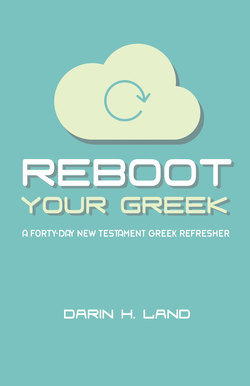Читать книгу Reboot Your Greek - Darin H. Land - Страница 12
На сайте Литреса книга снята с продажи.
Day 7: Review
ОглавлениеCongratulations on making it through week 1! Now is a good time to look back at how far you’ve come in one week. I hope you are feeling more confident, as things are starting to come back to you with the help of the lessons, the exercises, and the use of the Reader’s Edition. We’ve covered a lot of Greek ground this week, from the fine details (letters and sounds) to the big picture (word endings and word order), with a lot of stuff in between. Let’s take time to review these things.
Alphabet and pronunciation. First, review the alphabet. Try reciting the letters in order without looking; then look back if you’ve forgotten any. (By the way, don’t worry if you can’t recite the alphabet. The idea is just to keep the letters fresh in your mind.)
Look back at the diphthongs—they’re probably the most difficult part of remembering how to pronounce words in Greek. Remember that a diphthong is a pair of vowels that make a single sound, and therefore a single syllable. It’s possible for two vowels to appear together in a word and not form a diphthong. In that case, the two vowels form two syllables, not one. This gets easier with practice. If in doubt, you can use Bible software to pronounce a word for you (more on Bible software later).
Word endings and word order. Here we touched on one of the most important parts of the Greek language. In Greek, the way that words are formed carries a lot more information than it does in English, while the order of the words carries less information. In English, we form sentences by placing the subject before the verb, and the object after the verb. That’s how we know who is doing what to whom. Greek conveys that same information by changing the ending of the words. So the subject has one kind of ending (we call it nominative) and the object has another kind of ending (called accusative). In addition to nominative and accusative, there are also genitive and dative endings. Remember that the primary function of the genitive is what we call possession, while that of the dative is for indirect object.
We used “Greenglish” to reintroduce the idea of word endings versus word order. Greenglish used an adaptation of the most common Greek noun pattern (second declension). Using the Quick Start Guide (day 6), we looked at the second declension patterns and other common noun patterns in Greek.
Exercise 7
Go back through exercises 1–6. Reread the verses and passages that you read before. Try to stretch for a little more understanding than you had the first time through. As time permits, read a few more of the suggested verses/passages from each exercise that you couldn’t get to the first time through.
